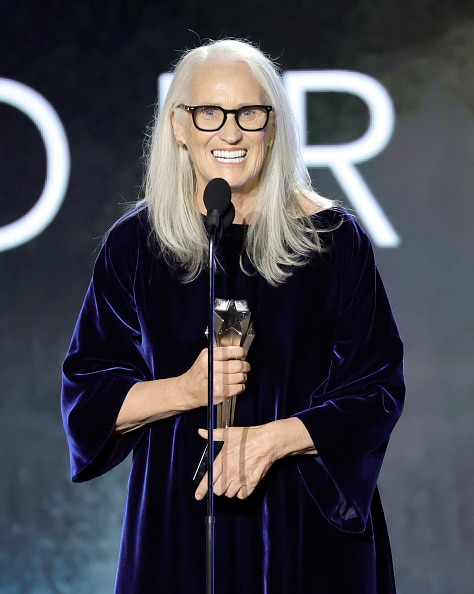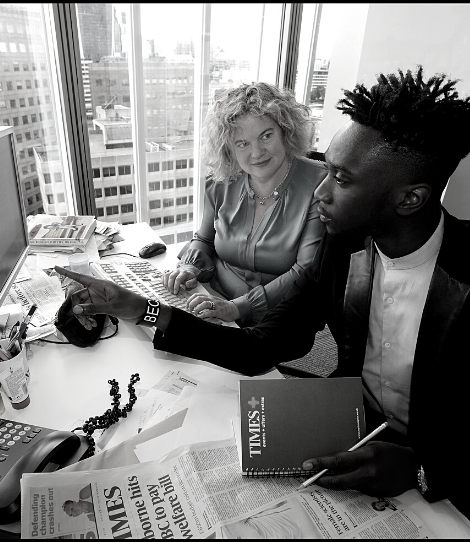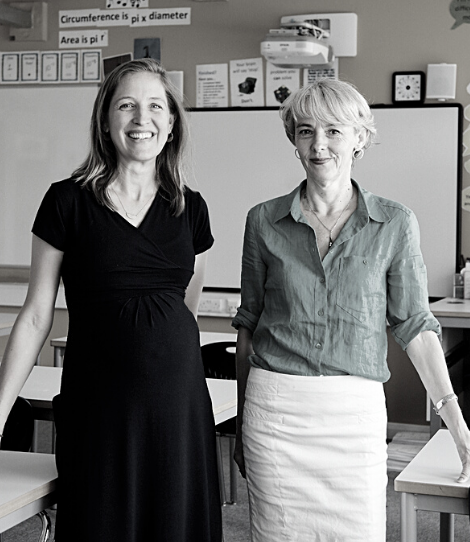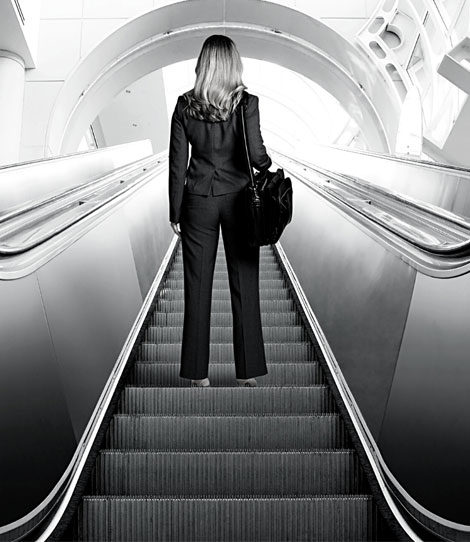It might have been Benedict Cumberbatch who made the BAFTA front pages but it was the female director of The Power of the Dog, Jane Campion, who was the real winner. She became only the third woman ever to win Best Director — and Best Actress also went to a middle-aged woman, Joanna Scanlan, 60.
The success of these two middle-aged women highlights the emergence of the power of the Queenager (as women in this demographic are being dubbed in the US). Many of the biggest recent TV shows were produced by older women. Big Little Lies? Reese Witherspoon, 50. The Wheel of Time produced by and starring Rosamund Pike, 52. Or the wonderful Mare of Easttown – a drama all about Kate Winslet, 52, the midlife mayor of a small American town.

Yet while Hollywood is beginning to realise the power of midlife women both in shaping and choosing what the rest of watch, too often women in midlife are overlooked.
Take me. I’m 50 and I’m the happiest I’ve ever been, have more money in the bank than I’ve ever had and I’m fitter too (the smallest jeans in my wardrobe are now baggy). Last week I went out with an old old friend who has just got divorced. We giggled, party-hopped, met loads of new people and ended up back at my house for a night cap; it was like being back in our teens.
Workwise things are pretty exciting too. I’ve just become an entrepreneur and am learning new things everyday and on the parenting front I am almost out of the woods (one daughter at Uni, the other doing A levels). In fact after 25 years of ticking all the boxes, I finally feel free of other people’s expectations. It’s like I’ve finally become the woman I am supposed to be.
Where are midlife women in the wider world?
Until now, I have felt my own life-stage being reflected back at me by the wider world: a raver in the 1990s; juggling working-mum in the 2000s. But don’t see myself or my midlife female peers anywhere. The only adverts directed at me are for wrinkle cream or incontinence pants (no, thanks) and the conversation around 50-something women is dominated by menopause (yes I’ll take HRT but I don’t want to be branded a walking hot flush). It’s like defining teenage girls by whether or not they are menstruating. And the whole point of feminism was for women not to be defined by their biology.
But then I am part of a large chunk of the population who usually just don’t get a look in. We are the women coming up behind such icons as Helen Mirren and Judi Dench (all in their 70s) but older than Holly Willoughby or the Duchess of Cambridge (in their 40s). There are some midlife icons – come on down Sarah Jessica Parker (And Just Like That, the reviled Sex and the City reboot is my guilty pleasure) and Melissa McArthy (the hero of Nine Perfect Strangers). And now, yes, Jane Campion and Joanna Scanlan have been given their rightful due.
Noon research about midlife women yielded insights
But these are the exceptions, not the rule, and the majority of women of this age feel completely unrepresented. After conducting the largest study of its kind into this cohort, I’ve discovered nearly half of women aged 45-60 feel ‘invisible’ – which doesn’t align with how powerful we are as a group.
In the US women like me are dubbed Queenagers – moving into a new phase, going through hormonal changes and are super-consumers (according to Forbes Magazine) responsible for 95% of all household spending decisions and out-spending younger women by 250%.
What’s a Queenager?
“It’s like being a teenager in my own house, but with nice sheets and good tea, and… I’m having a ball. I love it” explained Kath, a copywriter from Newcastle.
In the 2019 UK census, women over 40 out-earned women under 40 for the first time; proof that this pioneering generation of women really are different from any that have come before, sticking with their jobs through and out the other side of childrearing (if they have kids and 24% of the ABC1 professionals surveyed do not).
Measuring attitudes among Queenagers
These women are financially solvent – but the mainstream narrative about these women’s lives are not fit for purpose – a quarter of these women don’t have children and half of those are happy about that and chose not to be mothers. Thirty-five per cent live alone. Our survey of 2000 of these ABC1 women showed their life experience has brought them wisdom but they feel society doesn’t reflect that. And this matters because I want my daughters to look forward to being 50 as a moment of opportunity, when they come into their prime. But rather than being viewed as fine wine, too often women are viewed like peaches – one wrinkle and you are out. In the survey, 53% say it is “easier to be a man than a woman at this age”. As one London lawyer, 51, put it:“As you get older, particularly as a woman, people see you as kind of less attractive and less marketable… just LESS basically. I don’t want to be forgotten or invisible.”
Many in the groups feel a great sense of disconnect between how they feel and how they are perceived. “I just want to party as much as we possibly can. We don’t say no to anything, any trip, opportunity, concert… we’re there. We’re going to Stereophonics, UB40… we love it,” said a 50-something social worker from Aberystwyth group.
A solid 35% of the women reported being “happy” and nearly a fifth agree that “I am becoming the woman I am supposed to be”.
Forged in fire
The research also shows how resilient this group is. Forged in “fire” – as someone put it – more than half of the women have experienced at least five of the following: divorce, illness, bereavement, infertility, abusive and violent relationships, depression, job losses, parent death, sick children and financial crises. But the more a woman has endured, the more content she now seems. A textiles artist in the Edinburgh group summed it up: “As I get older vulnerability and strength are kind of interlinked, you become less worried to be vulnerable in fact you realise it is a strength.” Another who had survived losing her corporate job, infertility, divorce and the loss of both her parents described feeling happiness “in myself that I’m still here. It’s more than enough.”
“We talked about the power in the room,” said a teacher from Newcastle. “If we’d been having this conversation with 20 year olds, you wouldn’t have that. The power comes from the experience. Our strength comes from surviving that adversity – we know we can prosper.” As another of the Newcastle group put it: “The worst has happened, so you might as well just jump.”
Midlife means making yourself a priority
The sense of life being finite means 48% say “I have deliberately changed the path of my life as a result of previous experience” while 43% agree that this stage of my life “is finally about me, it is my turn”. They spoke about their lives as being in three stages. How in their 20s they felt centred, sure about where they were going, ambitious. In their 30s and 40s “it becomes all about looking after everyone else’s needs, whether that is at work or at home, or both”. But in their 50s these women are putting themselves centre stage.
Having time for themselves becomes the highest priority in their lives (after financial stability, health and family) notably ahead of having a partner, their work, or anything else. As one woman in London put it, “I’ve just got that sense of their being less time ahead than has gone before, I really want to make it count.”
Not all women are mothers
I have been particularly struck by the experiences of the women who are single and/or childfree. A staggering 24% of the women in the survey have no children. Half of those say they are happy about not being a mother with 41% saying “I didn’t/don’t ever want children”. But 31% of them said “I feel judged for not having children and nearly quarter said “I see too few women in the public eye who talk about being happy to be childfree.” These women are baffled that so few brands or companies want to engage them. As one senior lawyer told me: “I’m single, don’t have kids, I’m disposable-income-erama but no brands want to talk to me.” When pressed further she said: “People think there’s something weird about people that haven’t found somebody to settle down and have a family with. They are happy for you to shell out for stuff but they think you are a bit weird.”
Sex is important
When it comes to sex, 15% say that “sex is as important to them as ever” – one woman admitted she had just spent £200 on luxury version of a vibrator. Dating apps were generally seen as hostile for the older woman and when it came to chatting about finding new sexual partners the conclusion across all the groups was ‘there’s not much out there’. Many of the women still felt sexually vigorous but those who were single found partners more difficult to come by, with one in ten saying that nobody had touched them for over a month: “The opportunities for sex are less in a way, partly because I’ve got more responsibilities with running a business and kids…but sex has always been important to me and it shouldn’t have to be shunted to the background.”
When it comes to their appearance the influence of our youth-obsessed culture is clear. While four in ten “feel much younger than my age”, a third feel their bodies are “letting me down”. In a blow to the anti-ageing beauty industry, nearly half say “I am happy to age naturally”. Many of the women were outwardly angry with brands saying they should look younger, saying they found it a huge turn off. Those of us who have lost friends along the way know that to be older is to be lucky, rather than bemoaning our wrinkles we are grateful to have them and to still be here.
“If you spoke to me when I was a kid, and I thought about women in their fifties or sixties….They’d be ancient. But we are different. Here we all are now, wearing our Converse and our groovy little kind of things. I can’t imagine my mam doing that kind of 25, 30 years ago. We are different but society hasn’t caught up.”
Eleanor Mills
This piece originally featured in The Telegraph.
Read the Executive Summary of Noon’s research about the power of older women.
health
View All
Picture: Ray Wells
I lost the job I’d had for 23 years. My world fell apart but now I am glad
Losing her job left NOON editor Eleanor Mills at sea. But then she found a new path…

Why I’m still a rock chick in midlife
Julie Poole started singing at her her rough comprehensive in Nottingham. After a few detours, she’s grabbing the mic again.

Lessons from Now Teach about your second career
Teaching is a rewarding second career. The co-founder of Now Teach shares insights about switching tracks

Midlife reskilling is a revolution we need
The government’s reskilling initiative is perfect now that we’re all reconsidering returning to our old lives.



Loved the article, but your research on some of these actresses you cite is woefully inadequate! Reese Witherspoon is the same age as me: 47, as is Kate Winslet and you’ve severely aged poor Rosamund Pike – she was born in 1979 so nowhere near 52!